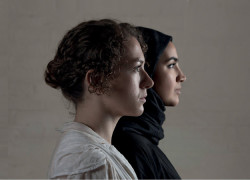
Word by Eleanor Boydell
“I have been the plaything of men for too long. Now, I will decide my own destiny.”
This quote speaks to the resolution achieved at the end of Echoes, a play by Henry Naylor. It’s the story of two women divided by culture and 175 years, but drawn together in a sisterhood of startling parallels. Tillie is a Victorian woman who, fearing spinsterhood, takes free passage East to marry a bachelor officer of the Raj, finding herself with him in Afghanistan, earnest about taking Christian values to the people. Centuries later Samira is a young Muslim woman pushed to jihad by the racism of modern-day Britain, flown to Syria to wed a fighter for the Islamic caliphate, passionate about the fight against non-believers.
The two women, portrayed by Rachel Smyth and Filipa Bragança respectively, find themselves alone in foreign and dangerous lands, unprepared for the disturbing realities of colonialism, war and terror. Two women dissatisfied by their homeland, sold a story of adventure, constrained by time and religion, at once too smart and too naïve, too strong and too innocent. Told in animated alternating monologue, the stories are parallel but allowed the flexibility to develop at their own pace. I found myself more deeply moved by Samira’s narrative – whether because of its political relevance, its contemporary language punctuated by humour and pop culture references, or because of the truly outstanding performance offered by Bragança, who inhabited the complex character of Samira in a way that attracted intense empathy. The play ends as the women find each other across time to deliver a stirring shared monologue, accompanied by the striking image of a woman removing her hijab.
Echoes has been doing the rounds and scooping up awards on the international Fringe circuit for the past year, and it’s clear why. In many ways it’s a simple play – with no distractions allowed from staging, costuming or music, the play relies solely on Naylor’s germane and witty writing and the two actors’ enthralling delivery. The complexity of Echoes comes through its exploration of the way sexism and racism constrain choice and lead people to extreme acts. As Tillie and Samira are disrespected and subject to violence by their husbands and their societies, the play becomes a painfully relevant commentary on the status of women across time and culture, of the “inequity of laws binding for women and too loose for men, twisted to men’s benefit.” But it’s okay, right? That’s not our culture? In a country where one in three women experience family violence in their lifetime, we shouldn’t be so sure.
Echoes is not so much a call to arms as a call to acquaint yourself with the reality of what’s going on in the world, to shake off ignorance and innocence. The play finds exhilarating climax as the two women claw back their agency and find ways to fight their abusers and define their own future. Better to die fighting than endure a life that’s not your own.

